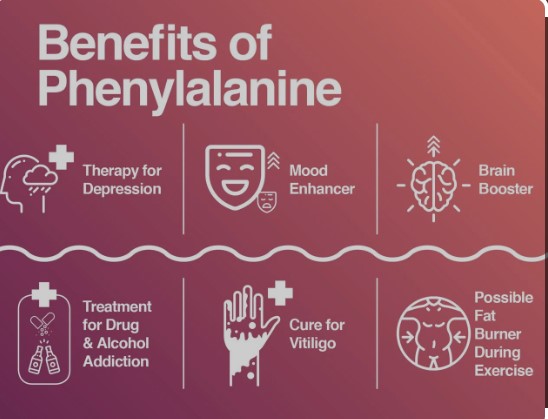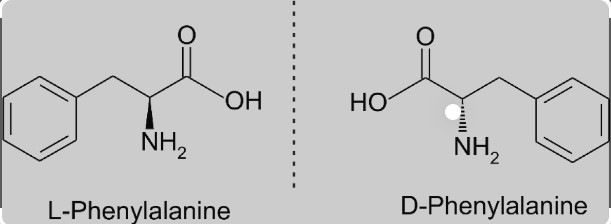Phenylalanine is an essential amino acid vital for human health, playing a crucial role in the biosynthesis of other amino acids and neurotransmitters. Although the body requires it for proper function, it cannot produce phenylalanine on its own; thus, it must be obtained through diet. This amino acid comes in several forms, with L-phenylalanine and DL-phenylalanine being the most common. Each form has unique properties and uses, making their distinction important for nutritional and therapeutic applications.
L-Phenylalanine is a naturally occurring form found in proteins, crucial for the production of neurotransmitters like dopamine and norepinephrine. On the other hand, DL-Phenylalanine is a synthetic blend of the L-form and its mirror image, the D-form, used differently in medical treatments. Understanding the differences between these forms can help individuals make informed decisions about their health and dietary needs.
The impact of these forms extends beyond simple nutrition; they influence mood, pain response, and overall mental health. Their functions and benefits vary, making it essential to distinguish between them when considering supplements and dietary choices.

Types of Phenylalanine
Phenylalanine is a crucial amino acid, essential for various biological processes. It exists mainly in two forms, L-Phenylalanine and DL-Phenylalanine, each serving different roles in human health and wellness.
L-Phenylalanine Description
L-Phenylalanine is the natural form of this amino acid, which is found in proteins throughout the body and in many foods, such as eggs, chicken, milk, and bananas. It is a building block for protein synthesis and is vital for producing a range of neurotransmitters.
DL-Phenylalanine Description
DL-Phenylalanine, or DLPA, is a synthetic product made in laboratories. It combines both the D-form and the L-form of phenylalanine. The D-form is not found in food and can affect brain chemistry differently from the L-form, making DLPA a unique tool in nutritional and psychological therapies.
Chemical Structure
L-Phenylalanine Structure
L-Phenylalanine has a simple structure that is crucial for its incorporation into proteins. It features a benzyl side chain that makes it aromatic and significantly influences its role in biological systems.
DL-Phenylalanine Structure
The structure of DL-Phenylalanine includes both the mirror-image D-form and the natural L-form. The inclusion of the D-form alters its interaction with various enzymes and receptors in the body.
Structural Differences
The primary difference between these forms lies in their molecular configuration. The L-form is naturally synthesized by the body, while the D-form, present in DLPA, can only be synthesized in the lab. This difference affects their biological activities and their utility in health supplements.
Biological Roles
Role of L-Phenylalanine
L-Phenylalanine plays a significant role in the production of neurotransmitters such as dopamine, norepinephrine, and epinephrine. These chemicals are essential for maintaining mood balance, alertness, and cognitive function.
Role of DL-Phenylalanine
DL-Phenylalanine is known for its dual role, impacting both pain relief and emotional well-being. Its ability to block certain enzymes allows it to prolong the action of endorphins, the body’s natural painkillers, which can help manage chronic pain conditions.
Health Benefits
Benefits of L-Phenylalanine
The health benefits of L-Phenylalanine are predominantly linked to its role in enhancing mental health and emotional well-being. Here are key benefits:
- Mood Enhancement: By facilitating the production of dopamine, L-Phenylalanine can help elevate mood and decrease symptoms of depression.
- Improved Alertness: It aids in the production of adrenaline, which enhances alertness and focus.
- Pain Relief: Though less direct, its role in neurotransmitter production can help modulate pain perception.
Benefits of DL-Phenylalanine
DL-Phenylalanine offers unique benefits due to its composition:
- Enhanced Pain Management: The presence of the D-form phenylalanine helps inhibit enzymes that break down endorphins, providing longer-lasting pain relief.
- Mood Stabilization: It assists in the stabilization of emotional responses, making it valuable in treating mood disorders.
- Addiction Recovery: Some studies suggest that DLPA may help reduce withdrawal symptoms and cravings associated with addiction recovery.
Usage in Supplements
Phenylalanine, in its various forms, is frequently incorporated into dietary supplements due to its significant health benefits. These supplements are designed to support mental health, manage pain, and enhance overall well-being.
L-Phenylalanine in Supplements
L-Phenylalanine supplements are commonly marketed towards individuals looking to boost their mental clarity and mood. They are especially popular among those seeking natural remedies for depression and anxiety. The role of L-Phenylalanine in neurotransmitter synthesis makes it a key ingredient in these supplements, as it helps to:
- Enhance cognitive function
- Improve mood and feelings of well-being
- Increase alertness and concentration
DL-Phenylalanine in Supplements
DL-Phenylalanine supplements are targeted towards a broader spectrum of needs, including mood stabilization and pain relief. These supplements combine the benefits of both the D and L forms, offering:
- Enhanced pain management capabilities
- Mood stabilization effects
- Support for addiction recovery processes
Comparative Analysis
When comparing L-Phenylalanine and DL-Phenylalanine in supplements:
- L-Phenylalanine is primarily used for its cognitive and mood-enhancing effects due to its direct role in neurotransmitter production.
- DL-Phenylalanine offers additional pain relief benefits, making it suitable for individuals dealing with chronic pain or recovery from addiction.
Side Effects
While phenylalanine supplements offer numerous benefits, they can also have side effects, especially if taken in high doses or without proper guidance.
L-Phenylalanine Side Effects
Potential side effects of L-Phenylalanine include:
- Nervousness and anxiety
- Headaches
- Heart palpitations These effects are typically mild and can be managed by adjusting the dosage.
DL-Phenylalanine Side Effects
DL-Phenylalanine may cause:
- Digestive upset
- Nausea
- Hypertension in high doses Care should be taken when starting any new supplement regimen, particularly for those with pre-existing health conditions.
Dietary Sources
Knowing the dietary sources of both forms of phenylalanine can help individuals meet their nutritional needs without over-reliance on supplements.
L-Phenylalanine Sources
Natural sources of L-Phenylalanine include:
- Meat, such as beef and chicken
- Fish, like salmon and tuna
- Dairy products, including milk and cheese
- Nuts and seeds
DL-Phenylalanine Sources
Since DL-Phenylalanine is a synthetic blend, it is not found naturally in foods. However, it is readily available in supplement form and can be incorporated into daily routines as recommended by health professionals.
Clinical Research
Extensive research has been conducted to explore the effects of both forms of phenylalanine on various health aspects.
Studies on L-Phenylalanine
Research on L-Phenylalanine has primarily focused on its role in treating mental health disorders and its effectiveness in enhancing cognitive functions. Studies have shown:
- Positive impacts on depression
- Improvements in alertness and mental clarity
- Potential benefits in managing ADHD symptoms
Studies on DL-Phenylalanine
Research on DL-Phenylalanine has explored its dual role in pain relief and mood enhancement. Key findings include:
- Efficacy in chronic pain management
- Benefits in mood stabilization for individuals with mood disorders
- Supportive effects in addiction recovery processes
Frequently Asked Questions
What is L-Phenylalanine?
L-Phenylalanine is an essential amino acid found naturally in protein-rich foods. It serves as a building block for protein synthesis and is critical for the production of several neurotransmitters and hormones that regulate mood and pain perception.
How is DL-Phenylalanine different?
DL-Phenylalanine combines the D and L forms of phenylalanine. This synthetic version can affect pain relief pathways differently than L-Phenylalanine alone and is often used in treatments for conditions like depression and chronic pain.
What are the benefits of L-Phenylalanine?
L-Phenylalanine primarily supports brain function by aiding in the production of dopamine, adrenaline, and noradrenaline. Its supplementation can help improve mood, increase alertness, and enhance cognitive function, particularly in individuals with deficiencies.
Can DL-Phenylalanine help with pain?
Yes, DL-Phenylalanine has been studied for its potential to manage chronic pain. It may help inhibit pain signals and enhance mood, which can be particularly beneficial in chronic pain management and psychological conditions.
Are there any risks associated with phenylalanine supplementation?
While phenylalanine supplements are safe for most people, they can cause side effects like heartburn, fatigue, and nausea. Individuals with conditions like phenylketonuria (PKU) should avoid phenylalanine due to their inability to metabolize it properly.
Conclusion
Phenylalanine plays a pivotal role in human health, with its different forms, L-phenylalanine and DL-phenylalanine, serving distinct purposes. Recognizing these differences is crucial for anyone considering their dietary and supplemental choices. Proper intake of these amino acids supports not just physical well-being but also mental health, influencing everything from mood to pain management.
By choosing the right form of phenylalanine and understanding its impact, individuals can effectively manage their health needs. Whether through diet or supplements, ensuring the correct balance and intake of this essential amino acid can lead to significant health benefits, making an informed choice essential for optimal health outcomes.

